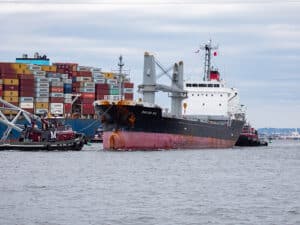
Op-Ed: How maritime can help the defense sector be sustainable
Written by
Karem Akoul, Project Manager at custom military equipment case manufacturers, CP Cases, provides his expertise.
The defense industry is an important pillar of society, providing stability, safety, and reassurance. The need for dependable and robust defense resources is as pressing as ever, and demand is unlikely to abate anytime soon.
However, according to a study by the International Maritime Organization, global shipping fleet accounts for 2.5% of all global CO2 emissions, whilst defense accounts for 80% of the U.S. government’s emissions overall. With this in mind, the defense industry must work to reduce negative environmental impacts while also aiming to future-proof against climatic disasters.

The maritime sector is facing a dual dilemma: attempting to reduce the impact the industry has on global warming, alongside needing to adapt ways of working to the impact climate change has already had.
Defense’s carbon footprint
It’s important that the defense industry plays its part in reducing the effects of climate change as a preventative measure. It is no secret that shipbuilding contributes significantly to greenhouse gas emissions and air pollution and, with this in mind, as a preventative strategy, the defense sector must contribute to lessening the effects of climate change.
While it is vital to plan for the rising urgency the impact of global warming is having on our planet, action must be taken now.
Disruption caused by extreme weather events
Climate change poses numerous obstacles to the defense industry. Research released by the European Defense Agency (EDA) and the European Commission’s Joint Research Centre (JRC)1 highlighted the threats that climate change poses to the future of defense sectors, urging a transition toward more sustainable practices. It highlighted the importance of developing national plans to protect against weather-related natural disasters, which are growing more common.
These climate risks, which include flooding, storms, and extreme temperatures, pose a significant threat to the defense sector’s operations. If the climate risk is not addressed, defense assets, capabilities, logistical operations, and civilian organizations involved in the operation of critical energy infrastructure (CEI) are all at risk.
In particular, the maritime and shipbuilding industry are among the most affected defense industry sectors, with warmer waters caused by climate change resulting in higher occurrences of low-pressure areas, harsher storms and gale-force winds heavily impacting the industry.
What can be done?
Defense by its very nature involves the manufacture and use of ecologically harmful materials, from the greenhouse gas emissions produced by the military-industrial complex to the management and disposal of hazardous waste. In light of this, every opportunity must be taken to offset the industry’s imprint.
It is crucial that providers achieve energy autonomy, enabling operations to continue where they would otherwise be grounded. The future success of the defense sector depends in large part on energy resilience in the face of catastrophic weather emergencies.
The JRC-EDA research, which recognizes the necessity for a methodical approach to achieving sustainability, points out the sector’s lack of capacity and aptitude to execute any substantial change when facing climate change. As a result, the paper suggests integrating sustainable measures into several industrial features, including operational aspects, capability planning and development, governance, multi-stakeholder involvement, and research, development, and innovation.
How Maritime & Shipbuilding Can Strengthen Sustainability Efforts
Beyond the JLC-EDA report, there are numerous ways in which the industry could mitigate effects and adapt to climate change.
- Sustainable Shipping Efforts: Alternative Energy, Cleaner Fuels, and Shipping Routes
Whilst this industry is hard to abate, a number of alternative energy and fuel options are now being created, tested, and implemented and provide promising paths to sustainable shipping.
Installing renewable energy technologies, such as solar panels, on ships is one way to make a positive impact. Reducing reliance on fossil fuels and, since defense uses up a lot of energy, finding alternative sources to draw from will benefit the industry by cutting down on carbon emissions from the power produced by fossil fuels.
Sustainable container management strategies can also significantly minimize waste and pollution in the industry. In addition, by introducing sustainable shipping efforts such as cleaner fuels, energy-efficient technologies, and optimized shipping routes, the industry may dramatically reduce its carbon footprint.
- Education: Internal and External Communication
Employees in the sector should be provided with training and opportunities for discussions surrounding decarbonization and climate change, ensuring that efforts to reduce emissions are coordinated across the industry.
A study conducted by the University of Glasgow found that workers were not being consulted by their unions or company leaders, despite expressing interest in developing strategies for achieving sustainability in defense.
Meanwhile, it is the duty of the defense industry to inform the public about its environmental policies. Transparency in the industry’s sustainability initiatives is essential because it is constantly under review. By laying out plans for real change, clear communication could readily allay concerns.
- Inventory-Level Decisions and Waste Management
More environmentally-friendly decisions could also be made at an inventory level, choosing to invest in recycled and recyclable equipment. Not to mention the fact that the contribution of the shipping sector to marine pollution has a profound impact on marine ecosystems, wildlife, and human health. Companies can mitigate this impact by implementing effective waste management systems that significantly minimize the quantity of garbage generated during operations.
A net-zero target by 2050 is undoubtedly a difficult feat for this industry, but by consistently implementing report-led recommendations, the maritime industry has a chance to disprove its critics and “go green” while enhancing operational performance.




